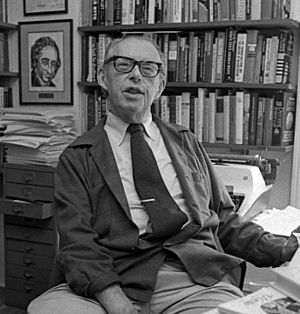Carey McWilliams (journalist) facts for kids
Carey McWilliams (December 13, 1905 – June 27, 1980) was an American writer, editor, and lawyer. He is famous for his books and articles about California. He wrote about important topics like the lives of farm workers and the forced relocation of Japanese Americans during World War II. From 1955 to 1975, he was the editor of The Nation magazine.
Contents
Early Life and Education
Carey McWilliams was born on December 13, 1905, in Steamboat Springs, Colorado. He moved to California in 1922. This happened after his family faced financial difficulties.
He studied at the University of Southern California. He earned a law degree in 1927.
From 1927 to 1938, McWilliams worked as a lawyer in Los Angeles. Some of his early cases involved defending striking Mexican citrus workers. This work showed his future interest in helping people. During the 1920s and 1930s, he also connected with other writers. These connections helped him start his writing career.
Standing Up for Others
The Great Depression and the rise of fascism in Europe made McWilliams more active in social issues. He started working with groups like the American Civil Liberties Union. He also wrote for progressive magazines. He continued to help workers and unions. He also worked for the new National Labor Relations Board. This board helps protect workers' rights.
Helping Farm Workers
His first very popular book, Factories in the Field, came out in 1939. It is still one of his most important works. The book looked at the lives of migrant workers in California. It criticized how large farms controlled land and treated workers.
Soon after the book was published, McWilliams took a job with the California government. He led the state's Division of Immigration and Housing. For four years (1938-1942), he worked to improve working conditions and wages for farm workers. However, his plans for big changes were affected by World War II.
Speaking Out for Equality
After leaving his government job in 1942, McWilliams wrote many more books. He focused on issues of racial and ethnic equality. He wrote about how immigrant and minority groups were treated. Some of his important books include Brothers Under the Skin and North from Mexico. He also wrote about California's history and culture.
He was a strong critic of the forced removal and internment of Japanese American citizens during World War II. In 1944, he published Prejudice: Japanese-Americans: Symbol of Racial Intolerance. This book was even mentioned by a Supreme Court Justice in a legal case.
Fighting for Civil Liberties
McWilliams also fought against McCarthyism. This was a time in the 1950s when people were unfairly accused of being communists. He believed this threatened people's freedoms. Even though he was never a member of the Communist Party, he was often targeted. He was called before the House Un-American Activities Committee. The FBI even put him on a list for possible detention.
He helped overturn the convictions of mostly Latino youths in the Sleepy Lagoon murder trial. He also helped calm tensions during the Zoot Suit Riots in 1943. These riots involved conflicts between servicemen and Latino youths in Los Angeles.
Editor of The Nation
In 1951, McWilliams moved to New York City to work for The Nation magazine. He became the editor in 1955 and stayed until 1975. He is known for making the magazine stronger. He encouraged more investigative reporting. He also published early works by famous writers like Ralph Nader and Hunter S. Thompson.
Revealing Secrets
McWilliams was the first American reporter to reveal a big secret. He reported that the CIA was training Cuban exiles in Guatemala. This was for the Bay of Pigs Invasion. His article, "Are We Training Cuban Guerrillas?", was published in November 1960. This was five months before the invasion happened.
Major newspapers did not widely report his story. After the invasion failed, President John F. Kennedy said he wished more information had been published. He believed it might have prevented a "colossal mistake."
Legacy
Carey McWilliams passed away on June 27, 1980, at the age of 74. Since his death, his work has become even more recognized. The American Political Science Association gives an award in his name. It honors journalists who help us understand politics better.
A California historian named Kevin Starr called McWilliams "the single finest nonfiction on California–ever." Many people see him as one of the most important public thinkers of the 20th century.
His papers and writings are kept at the Bancroft Library at the University of California, Berkeley. They are also at Special Collections at the University of California, Los Angeles.
Works
- Ambrose Bierce: A Biography (1929)
- Brothers Under the Skin: African-Americans and Other Minorities (1943)
- California: The Great Exception (1949)
- The Education of Carey McWilliams (1979)
- Factories in the Field: The Story of Migratory Farm Labor in California (1939)
- Ill Fares the Land: Migrants and Migratory Labor in the United States (1942)
- A Mask for Privilege: Anti-Semitism in America (1948)
- North from Mexico: The Spanish-Speaking People of the US (1949)
- Prejudice: Japanese-Americans, Symbol of Racial Intolerance (1944)
- Southern California Country: An Island on the Land (1946)


